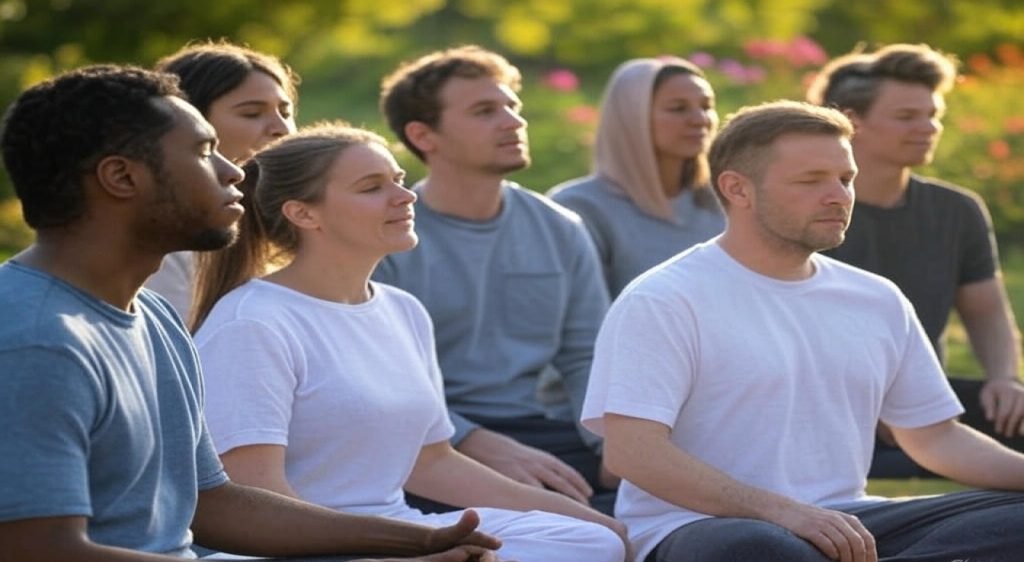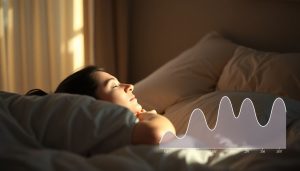As I reviewed Mrs. Johnson’s vital signs, my eyes froze on the screen, her blood pressure had skyrocketed, dangerously high. Concern tightening in my chest, I turned to her, my voice low but firm. After a tense pause, and with eyes clouded by fatigue, she finally murmured, “Doctor, I haven’t slept properly in two days… There’s something going on at home and it’s been tearing me apart.” In that moment, the benefits of good sleep for mental health became painfully clear.
Globally, science backs this up. In fact, researchers from Harvard Medical School have confirmed that inadequate sleep significantly increases the risk of anxiety and depression (Harvard Health). Yet in Africa, conversations about sleep often take a backseat, but it’s time to change that. This article explores the deep links between sleep and mental health, through the lens of both African realities and global experiences, supported by expert voices and relevant research.
Science Behind The Brain, Good Sleep and Mental Health
Your brain needs sleep the same way your body needs food. Sleep is when the brain processes emotions, consolidates memory, and repairs itself. There are two main stages of sleep: REM (rapid eye movement) and non-REM sleep. During REM sleep, emotional regulation happens. Without enough of it, stress builds up unchecked.
A report by the World Sleep Society confirms that poor sleep can alter brain activity in the amygdala, the part that processes fear and anxiety. That means your brain literally becomes more reactive when you’re tired.
Sleep is more than just downtime; it’s a powerful neurological process. As neuroscientist Dr. Matthew Walker, author of Why We Sleep, notes, “Sleep is the single most effective thing we can do to reset our brain and body health each day.” When sleep is cut short or disrupted, these vital processes are impaired, leading to anxiety, mood swings, and cognitive fog.
Globally, around 30–50% of adults report sleep disturbances. In Africa, factors like urban noise, job stress, and social pressures are growing culprits. A 2021 study in the South African Journal of Psychology found that 40% of urban South Africans suffered from poor sleep linked to financial stress and environmental noise, often accompanied by rising anxiety levels.
Why Good Sleep For Mental Health is Critical
The benefits of good sleep for mental health are undeniable. Sleep refreshes your brain, helping you tackle challenges with clarity. Dr. Aisha Bello, a neuropsychologist in Lagos, says, “In Nigeria’s high-stress environment, good sleep acts like a shield against anxiety.” A 2019 Nature Communications study found that one night of poor sleep spikes anxiety by 30%. Conversely, quality sleep lowers cortisol, the stress hormone, making you more resilient. Embracing the benefits of good sleep for mental health means giving your mind the reset it craves. See Video: Why You Must Sleep Well
How Sleep Rewires Your Brain for Better Mood
Ever notice how a great night’s sleep leaves you upbeat? That’s the benefits of good sleep for mental health at work. During sleep, your brain processes emotions, strengthening neural pathways for positivity. Dr. Chidi Eze, a Port Harcourt psychiatrist, explains, “Sleep helps Nigerians manage emotional stress from daily hustle.” Dr. Sarah Lopez, a UK-based psychiatrist, agrees: “REM sleep regulates emotions, preventing mood swings.”
Research from the Journal of Neuroscience (2020) shows that 7–9 hours of sleep boosts serotonin activity, enhancing mood by 25%. Skimp on sleep, and your amygdala—your brain’s emotional hub—goes haywire, per a 2017 Psychiatry Research study. Prioritize sleep to unlock these mental health perks.
Good Sleep For Mental Health in African Culture
In many African communities, rest is wrongly equated with laziness. There’s a pride in hustling hard and sleeping less. Proverbs like “Early to rise is early to succeed” can unintentionally glamorize sleep deprivation.
“In African culture, sleep isn’t prioritized unless someone falls ill,” says Prof. Akua Agyeman, a Ghanaian sleep researcher. “But rest is prevention, not just cure.”
At the same time, traditional practices, like evening storytelling, herbal infusions, and communal mealtimes, can promote sleep naturally. It’s time to reclaim those rituals.
Good Sleep For Mental Health: Impact of Modern African Lifestyles
Urbanization has transformed how Africans live and sleep. Long commutes, smartphones, and 24/7 hustle culture mean fewer people are getting the recommended 7–9 hours of sleep. Read also: Managing Stress
Sleep procrastination—delaying bedtime for entertainment—affects nearly 1 in 3 urban Africans, according to a 2022 survey by Afrobarometer. Globally, the WHO has labeled poor sleep an “epidemic” in modern societies (WHO Sleep Report).
Causes of Sleep Deprivation—and Their Solutions
Sleep deprivation doesn’t always happen by choice. Here are 20 real-life culprits keeping Africans and people globally awake, and how to tackle them.
| Cause | Solution |
| 1. Late-night phone scrolling | Set screen curfews; use blue-light filters or night mode. |
| 2. Overthinking/worrying | Try journaling or breathing exercises before bed. |
| 3. Work or study overload | Use time-blocking and avoid all-nighters. |
| 4. Unpredictable electricity (NEPA issues) | Charge devices early; use candles or solar lamps to relax. |
| 5. City noise (e.g., traffic, generators) | Use earplugs, white noise apps, or thick curtains. |
| 6. Financial stress | Seek support; don’t bottle it up—try mental health hotlines. |
| 7. Late heavy meals | Eat at least 2 hours before bed; avoid spicy foods. |
| 8. Caffeine consumption late in the day | Cut off coffee, tea, and energy drinks by 2 p.m. |
| 9. Alcohol or smoking | These disturb REM sleep—try herbal teas instead. |
| 10. Poor sleep environment | Keep your room dark, cool, and clutter-free. |
| 11. Chronic pain | Consult a doctor; consider safe pain-relief options. |
| 12. Parenting stress | Share night duties; nap when your child naps. |
| 13. Social media addiction | Unfollow anxiety-triggering accounts; set limits. |
| 14. Job shift changes/night work | Stick to consistent wake/sleep times even on off days. |
| 15. Hormonal changes (especially in women) | Track cycles; speak to a doctor if sleep disruption is regular. |
| 16. Poor mattress or bedding | Invest in quality pillows and breathable sheets. |
| 17. Underlying sleep disorders | See a sleep specialist for conditions like insomnia or sleep apnea. |
| 18. Lack of exercise | Aim for 30 minutes of daily movement—preferably outdoors. |
| 19. Loneliness or isolation | Join community or online support groups. |
| 20. Excessive screen time before bed | Switch to a book, meditation, or music to wind down. |
Tackling these issues doesn’t require wealth, just awareness, routine, and small daily changes.
Harmful Effects of Poor Sleep and Stress on Mental Health
Stress and sleep deprivation often feed off each other. Poor sleep intensifies stress by reducing your ability to regulate emotions, while stress makes it harder to fall and stay asleep. This vicious cycle can lead to long-term psychological strain. A 2022 study in Nature Reviews Neuroscience confirmed that lack of sleep heightens cortisol production and worsens anxiety and PTSD symptoms.
“When patients come in with anxiety, I always ask about sleep first,” says Dr. Tolu Okocha, a Lagos-based psychiatrist. “In most cases, poor sleep is both a cause and a symptom of mental distress.”
Studies show that just one night of sleep deprivation can raise cortisol levels, the stress hormone, by up to 37% (University of California, Berkeley).
In African cities, this feedback loop is evident among informal workers—like Nigeria’s market traders—who often get less than six hours of sleep per night. As stress builds, productivity and well-being plummet. Globally, overworked professionals in tech, healthcare, and education report similar cycles of exhaustion and emotional fatigue.
Good Sleep For Mental Health : Common Health Conditions
Long-term sleep deprivation increases the risk of:
- Depression: 75% of people with depression report poor sleep (Sleep Foundation).A 2019 NIH study found that insomniacs are 10 times more likely to develop depression. Meanwhile, a 2022 Lancet study showed that consistent sleep patterns cut depression risk by 22%. By embracing the benefits of good sleep for mental health, you build a fortress against low moods.
- Anxiety: The less you sleep, the more your brain misreads neutral events as threats.
- Burnout: Especially in professionals and caregivers.
- Bipolar disorder: Disrupted sleep often triggers manic or depressive episodes.
Sleep is not a luxury. It’s medical therapy.
Good Sleep For Mental Health: Practical Tips
Improve Sleep Hygiene
This starts with simple, consistent habits:
Stick to a schedule – Go to bed and wake up at the same time daily.
Wind down mindfully – Try low-energy activities like prayer, meditation, or music.
Limit screen time – Put your phone away 30–60 minutes before bed.
Eat and drink smart – Light dinner, minimal sugar, no late caffeine. Read also: How Hidden Sugars Sabotage Your Health
Move your body – Regular exercise improves sleep depth. Read also: Best Diet For Weight Loss
Check your room – Keep it cool, dark, and quiet.
Use natural remedies – Chamomile, valerian root, and lemongrass teas help. Read also: How To Sleep Naturally
Calm the Mind with Mindfulness Practices

Mental stillness is key to controlling stress. Practices like deep breathing, meditation, or prayer can reduce cortisol and promote peace.
In Kenya, the Ustawi wa Akili program introduces breathing and mindfulness in schools and churches to help youth build emotional awareness.
Worldwide, tools like Headspace and Calm make mindfulness accessible with daily guided exercises—even 5–10 minutes can lower stress levels.
Talk About It

Stigma often prevents people—especially in African cultures—from opening up. But speaking with a friend, therapist, or group can be healing.
Zimbabwe’s Friendship Bench project has trained grandmothers to provide community-based talk therapy in local dialects—making mental health support approachable and trusted.
Get Moving

Physical activity supports both sleep and mood regulation. It doesn’t have to be gym-based—dancing, walking, or playing traditional games like ayo or mancala can do wonders for body and mind. Read also: How To Exercise Without A Gym
When to Seek Help
If sleep issues persist for more than 3 weeks, speak to a health professional. Watch for these red flags:
- Trouble falling or staying asleep
- Constant fatigue despite 8+ hours of sleep
- Snoring, gasping, or choking during sleep
- Feeling low, irritable, or overwhelmed every morning
In Africa, sleep clinics and mental health services are expanding. Try these:
- Mentally Aware Nigeria Initiative (MANI) – mentallyaware.org
- She Writes Woman (Nigeria) – shewriteswoman.org
- Africa Mental Health Foundation (Kenya) – amhf.or.ke
FAQs on Good Sleep for Mental Health
- What are the key benefits of good sleep for mental health?
Good sleep reduces stress, boosts mood, and sharpens focus, per NIH research, making it essential for mental wellness. Read also: Fatigued-Driving
- How much sleep is ideal for mental health?
Adults need 7–9 hours nightly, says Dr. Matthew Walker. A 2020 Sleep Journal study confirms this optimizes mental health.
- Can poor sleep worsen anxiety?
Yes, a 2019 Nature Communications study found that one sleepless night increases anxiety by 30%.
- How does sleep help with depression?
Consistent sleep cuts depression risk by 22%, per a 2022 Lancet study, by stabilizing mood.
- What’s the best way to improve sleep quality?
Stick to a schedule, limit screens, and relax before bed, advises Dr. Tolu Adeyemi, to unlock the benefits of good sleep for mental health
Final Thoughts on Good Sleep For Mental Health
In a world obsessed with productivity, choosing rest is a radical act of self-preservation. Prioritizing sleep and managing stress isn’t laziness—it’s leadership over your well-being. So whether you’re braving Lagos traffic or a London deadline, don’t neglect your brain’s call for balance. Breathe, unplug, and rest. Because the benefit of good sleep for mental health cannot be over emphasized.
Which sleep strategy will you begin with today? Let’s know in the comments and good luck in your good sleep for mental health journey.
Subscribe to our newsletter for more health tips, share this post with others and join our free WhatsApp or Facebook support group.
Your health is your wealth—prioritize it today!
Medical Disclaimer
This article is for educational purposes only and does not replace professional medical advice. Always consult a qualified healthcare provider before making medical changes, especially if you have symptoms or existing health conditions.





Pingback: Secrets of Longevity: Live Healthier and Age Slower - Healths Clinic
Pingback: Managing Stress in the Always-On Generation
Pingback: Improve Sleep Naturally: Beat Insomnia Without Pills
Pingback: The Best Pregnancy Care Tips for Nigerian Women
Pingback: How To Break Mental Health Stigma in Nigeria: The Facts
Pingback: Diabetes Mellitus: Causes, Signs, and Management Strategies
Pingback: Common Women’s Health Disorders in Nigeria Explained
Pingback: Top 20 Causes of Convulsions in Nigeria
Pingback: 20 Natural Ways to Sharpen Your Eyesight